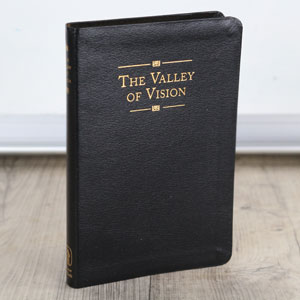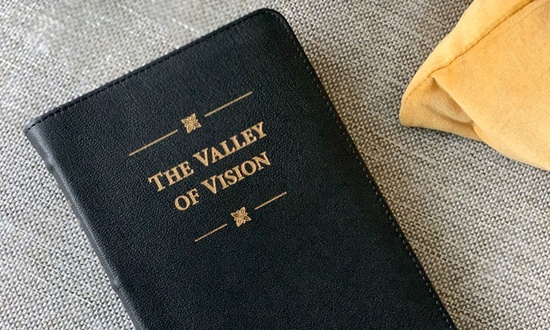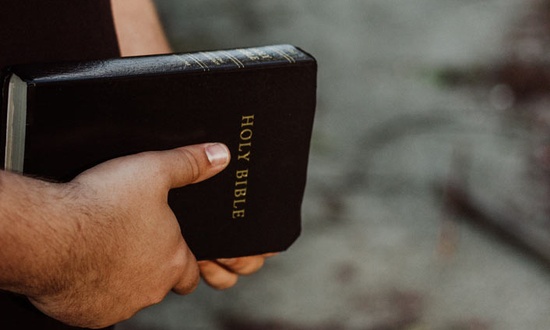I’ve written in the past about how highly Nanci and I recommend The Valley of Vision, the book of Puritan Prayers. It’s a truly amazing God-exalting, Christ-centered compilation of prayers from the Puritans, including a few who lived after the Puritan era but were Puritans in Heart, notably Charles Spurgeon.
Last night, attached to her portable chemotherapy unit for what we hope is the last time (see her CaringBridge page for updates), Nanci read me this from The Valley of Vision: “I rejoice to think that all things are at thy disposal, and it delights me to leave them there. Then prayer turns wholly into praise, and all I can do is to adore and bless thee...but I can through grace cheerfully surrender soul and body to thee, that thy sole motive in working in me is to will and to do for thy good pleasure.”
 We can’t recommend this book highly enough. It has enriched us so much over the years, yet many believers remain unfamiliar with it. We have given it away a number of times, and it’s a wonderful gift. (Here it is on Christianbook.com, and on Amazon.)
We can’t recommend this book highly enough. It has enriched us so much over the years, yet many believers remain unfamiliar with it. We have given it away a number of times, and it’s a wonderful gift. (Here it is on Christianbook.com, and on Amazon.)
Some readers will be scared away by the word “Puritan” because of the image of frowning and Pharisaical religious types without a warm relationship with God. In fact, that stereotype is so wide-spread that a seminary professor told me, “The God of the Puritans was remote and impersonal.” My response was to respectfully disagree and to ask him how many of the Puritans he had actually read.
Here’s something I wrote in my book Happiness: Consider satirist and journalist H. L. Mencken’s (1880–1956) definition of Puritanism: “the haunting fear that someone, somewhere, may be happy.” [1] On the contrary, Puritans, judging by their writings, were some of the happiest people who have ever lived! Considerably happier, judging by his writings, than H. L. Mencken.
I also wrote, “Let the Puritans serve as a wake-up call as well—they often experienced and spoke of profound happiness in seemingly unbearable circumstances. Like skilled blacksmiths, they forged happiness on Scripture’s anvil, under the severe hammer of life . . . all the while smiling at the bountiful beauties of God’s creation and providence.”
Here’s one of those Puritan prayers, part of which I cited in my book Happiness. It’s also titled “Happiness”:
O LORD,
Help me never to expect any happiness
from the world, but only in thee.
Let me not think that I shall be more happy
by living to myself,
for I can only be happy if employed for thee,
and if I desire to live in this world
only to do and suffer what thou dost allot me.
Teach me
that if I do not live a life that satisfies thee,
I shall not live a life that will satisfy myself.
Help me to desire the spirit and temper of angels
who willingly come down to this lower world
to perform thy will,
though their desires are heavenly,
and not set in the least upon earthy things;
then I shall be of that temper I ought to have.
Help me not to think of living to thee
in my own strength,
but always to look to and rely on thee
for assistance.
Teach me that there is no greater truth than this,
that I can do nothing of myself.
Lord, this is the life that no unconverted man
can live,
yet it is an end that every godly soul
presses after;
Let it be then my concern to devote myself
and all to thee.
Make me more fruitful and more spiritual,
for barrenness is my daily affliction and load.
How precious is time, and how painful to see it fly
with little done to good purpose!
I need thy help:
O may my soul sensibly depend upon thee
for all sanctification,
and every accomplishment of thy purposes
for me, for the world,
and for thy kingdom.
[1] H. L. Mencken, A Mencken Chrestomathy (New York: Vintage Books, 1982), 624.
Photo by Amaury Gutierrez on Unsplash




